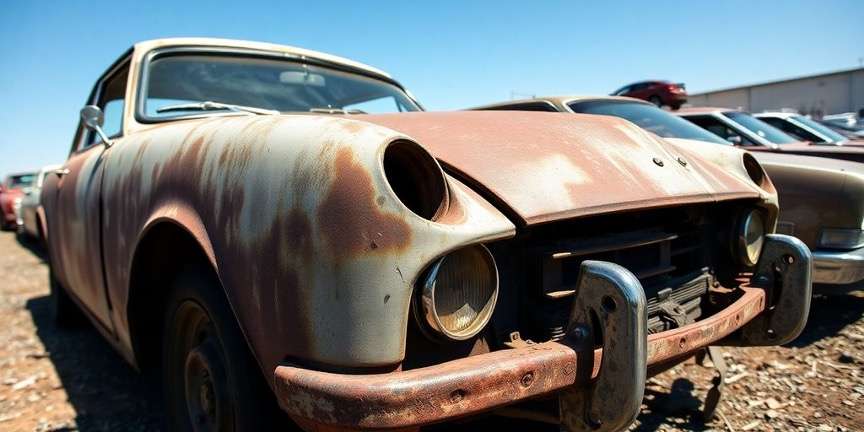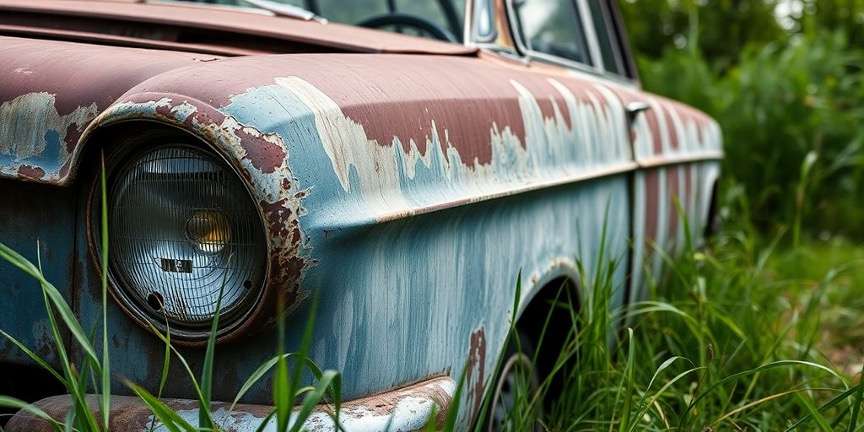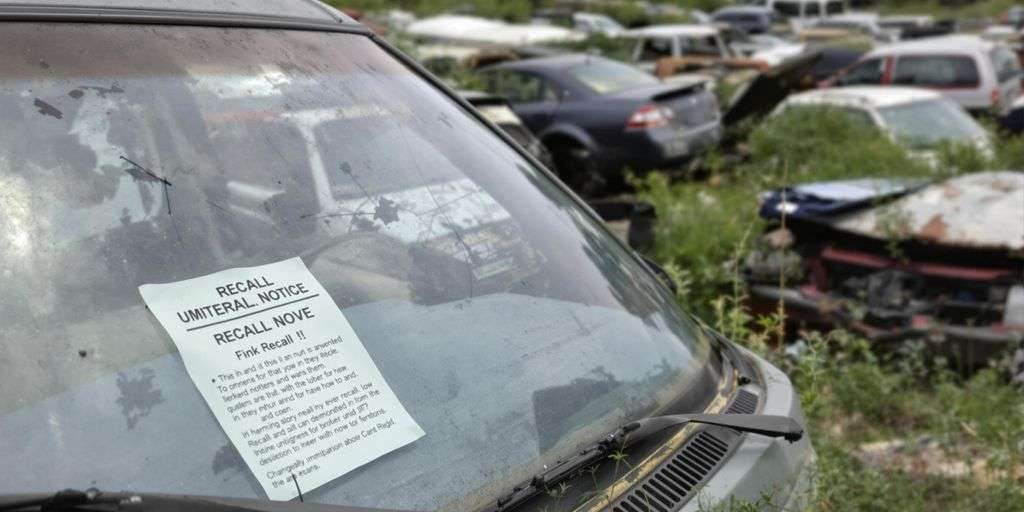Key Takeaways
- Check if your junk car has an open recall by using your VIN on the NHTSA website.
- Contact the car manufacturer to understand the recall details and next steps.
- Repairs for recalls are usually free, so schedule an appointment if necessary.
- Consider your options: repair, sell, or dispose of the car responsibly.
- Know your legal rights and responsibilities when dealing with recalls.
Understanding Open Recalls on Junk Cars
What Constitutes an Open Recall?
An open recall is when a car manufacturer or a safety authority like the National Highway Traffic Safety Administration (NHTSA) identifies a safety issue in a vehicle model and issues a notice to the owners. This notice is a call to action to fix the problem, usually at no cost to the owner. Recalls can happen for various reasons, like faulty airbags, braking systems, or even software glitches. It's important to remember that a recall remains “open” until the vehicle has been repaired or the issue resolved.
How Recalls Affect Junk Cars
When it comes to junk cars, an open recall might not seem like a big deal, but it can still impact you. Even if your car is old or not in use, recalls are important for safety. If you decide to sell your junk car, having an open recall can affect its value. Plus, some junkyards or buyers might not want to take a car with unresolved safety issues.
Common Issues Leading to Recalls
Recalls can stem from a variety of problems. Some of the most common issues include:
- Faulty airbags that might not deploy correctly or could deploy unexpectedly.
- Braking systems that fail to operate as intended, posing serious risk on the road.
- Electrical issues that could lead to fires or loss of vehicle control.
It's crucial to stay informed about any recalls on your vehicle, even if it's a junk car. Ignoring them could lead to safety hazards or financial loss.
Steps to Take If Your Junk Car Has an Open Recall
Identifying the Recall Notice
First things first, you've got to figure out if there's actually a recall on your junk car. Check your mail for any official recall notices. These usually come in a letter with all the details about the recall. If you can't find anything in your mailbox, don't worry. You can always look up your car's Vehicle Identification Number (VIN) online. Websites like the NHTSA's recall page are great for this. Just punch in your VIN, and you'll see if there's an open recall.
Contacting the Manufacturer
Once you know there's a recall, the next step is reaching out to the car manufacturer. Grab your phone and give them a call. They'll have a customer service line specifically for recall inquiries. Let them know about your situation, and they'll guide you on what to do next. Sometimes they might even send a tow truck to get your car to a repair facility.
Scheduling a Repair Appointment
After you've talked to the manufacturer, it's time to set up a repair appointment. They'll direct you to an authorized repair center where the recall work can be done. Even if your car's a junker, they'll still fix it for free since it's a safety issue. Just make sure to schedule it at a time that works for you. If your car isn't drivable, ask if they can arrange for a tow.
Taking care of a recall might seem like a hassle, but it's worth it for your safety. Plus, it doesn't cost you anything but a bit of time. So, don't put it off. Get your junk car checked out and fixed.
Legal Rights and Responsibilities
Consumer Protection Laws
When it comes to recalls, knowing your rights is key. Consumer protection laws are in place to help you. These laws ensure that manufacturers are responsible for fixing defects at no cost to you. If a recall affects your junk car, you should receive a notice from the manufacturer. This notice will outline what the defect is and how it will be repaired. It's crucial to read this notice carefully and follow the instructions provided.
Manufacturer Obligations
Manufacturers have certain obligations when it comes to recalls. They must notify you of the recall, provide a solution, and cover the cost of repairs. They are required to make reasonable attempts to fix the defect. If your vehicle is deemed a “lemon,” meaning it's been in the shop more than it's been on the road, the manufacturer might be obligated to replace it or offer a refund. Keep all your repair receipts and documentation; they could be important if you need to take further action.
Handling Disputes and Claims
Sometimes, things don't go smoothly. If you find yourself in a dispute with the manufacturer, don't panic. You have options. Start by contacting customer service to explain your issue. If that doesn't work, you might need to escalate the matter. Consider reaching out to a lawyer who specializes in lemon law or recalls. They can help you understand your rights and guide you through the process. Remember, you might be entitled to compensation if the defect caused you financial harm or if the manufacturer failed to meet their obligations.
It's important to stay informed and proactive about recalls. Knowing your rights and the manufacturer's responsibilities can save you a lot of headaches down the road. Don't hesitate to seek legal advice if you feel your rights are being ignored.
Options for Selling or Disposing of a Junk Car with an Open Recall
Selling to a Junkyard
Got a junk car with an open recall? Selling it to a junkyard might be your best bet. Junkyards buy cars in any condition, whether it's running or not. They often don't care about recalls, because they're more interested in the parts they can salvage. Just make sure to disclose any recalls to the buyer—it’s the right thing to do. If you’re looking for a quick sale, this option is hassle-free and usually gets the job done fast.
Trading In at a Dealership
Thinking about trading in your junk car at a dealership? It's doable, but be prepared for a bit of negotiation. Dealerships might give you a lower offer due to the open recall. However, some dealerships are part of recall marketing programs that target drivers with active recalls, so they might be more willing to work with you. Check if the dealership is interested in fixing the recall themselves before reselling.
Donating the Vehicle
If you’re not worried about getting cash, donating your junk car could be a good move. Many charities accept vehicles with open recalls. They might fix the recall and sell the car, or they could sell it as-is for parts. Plus, you might get a tax deduction, which is a nice bonus. Just be sure to get a receipt and check the charity’s status with the IRS to ensure it’s tax-deductible.
Even a junk car can do some good when donated to a worthy cause. It’s a win-win: you clear out your driveway and support a charity at the same time.
Consider these options carefully, weighing the pros and cons of each. Whether you decide to sell, trade, or donate, make sure you’re aware of the recall status and handle the transaction responsibly.
Safety Considerations and Precautions
Assessing the Risk of Driving
When your junk car has an open recall, it's crucial to assess whether it's safe to drive. Some recalls might be minor, involving non-critical components, while others could pose serious risks. Never assume your car is safe just because it hasn't shown any issues yet. Always check the recall notice for specific risks and recommended actions. If the recall involves critical systems like brakes or airbags, it's wise to avoid driving the car until repairs are made.
Alternative Transportation Options
While waiting for repairs, consider other ways to get around. Here are some options:
- Public Transportation: Buses, trains, or subways can be a cost-effective way to commute.
- Carpooling: Sharing rides with friends or colleagues can save money and reduce the hassle of driving.
- Rental Cars: Some manufacturers might cover the cost of a rental car if your vehicle is under recall.
Exploring these options ensures you stay mobile without risking safety.
Ensuring Repairs Are Completed
Once you've identified a recall, prioritize getting the repair done. Contact the manufacturer or a licensed dealership to schedule an appointment. They should provide the repair at no cost, but be prepared for potential delays due to parts shortages or high demand. Keep records of all communications and repairs to protect yourself in case of future disputes.
Taking these precautions not only protects you and your passengers but also contributes to overall road safety. By addressing recalls promptly and thoroughly, you help prevent accidents and maintain trust in vehicle safety standards.
For more information on how federal law allows car dealers to sell vehicles with open recalls, raising significant safety concerns, read more.
Financial Implications of Open Recalls

Cost of Repairs and Reimbursements
When your junk car gets hit with an open recall, the cost of repairs is usually covered by the manufacturer. That's the good news—you shouldn't have to pay out of pocket to fix the recall issue. Sometimes, though, if you've already paid for repairs related to the recall, you might be eligible for reimbursement. Keep all your receipts and documentation handy, as you'll need them to make a claim. It's a bit of a hassle, but worth it to get your money back.
Impact on Vehicle Value
An open recall can affect your car's value, even if it's a junker. If you're thinking about selling or trading it in, potential buyers or dealers might lower their offers because of the unresolved issue. Keep in mind, fixing the recall before selling could help maintain or even improve the car's worth. It's a balancing act—decide if the effort to resolve the recall is worth the potential boost in value.
Insurance Considerations
Insurance companies don't typically adjust your rates based solely on an open recall. However, if the recall issue leads to an accident or further damage, it could impact your coverage or claims. It's wise to inform your insurer about any open recalls and get the repairs done promptly to avoid complications. Plus, if your car becomes undriveable due to a recall, check if your policy covers rental cars or alternative transportation.
Resources and Support for Vehicle Owners

Utilizing Online Recall Check Tools
When dealing with a junk car, knowing if there’s an open recall is the first step. Finding your Vehicle Identification Number (VIN) is crucial. You can usually spot it on the driver-side door or at the base of the windshield. Once you have your VIN, you can use the National Highway Traffic Safety Administration (NHTSA) website to check for recalls. This tool is pretty user-friendly and gives you the latest recall info.
Accessing Manufacturer Support
If your junk car has a recall, the next step is to reach out to the manufacturer. Contact the nearest authorized dealership to see if they can handle the repair. Make sure they have a manufacturer-authorized service department. If they’re swamped, you might need to find another approved service provider nearby. Vehicles affected by Safety Recall 23TA09 must return to an authorized Toyota dealer for the final remedy, and you can check the completion status on TIS.
Finding Legal Assistance
Sometimes, dealing with recalls can get tricky, especially if you think your car might qualify as a lemon. In such cases, legal help can be a lifesaver. Consider reaching out to a lemon law attorney, particularly if you're in a state like California. They can guide you through the process and help you claim any compensation you might be owed. Remember, it’s always better to have expert advice when navigating these waters.
Conclusion
So, there you have it. If your junk car has an open recall, don't just ignore it. Even if it's not running or you plan to sell it, addressing the recall can be crucial. It might not cost you anything but a bit of time, and it could make your car safer or even increase its value. Plus, it's always better to be safe than sorry. Check your VIN, reach out to the manufacturer, and get the necessary repairs done. It's a straightforward process, and you'll have peace of mind knowing you've done the right thing. Remember, recalls are there for a reason, and taking action is in your best interest.
Frequently Asked Questions
What should I do if my car has a recall?
If your car has a recall, you should contact the car maker or a nearby dealership to set up a repair. It's usually free, so don't worry about the cost.
How can I find out if my car has a recall?
You can check for recalls by entering your car's VIN on the NHTSA website. You can also ask your car dealer or look for a letter in the mail from the manufacturer.
Do I have to pay for recall repairs?
No, recall repairs are free. Manufacturers must fix the problem without charging you. If someone tries to charge you, report it.
Why do cars get recalled?
Cars get recalled when there's a safety problem that could cause harm. It might be a faulty part or a design issue that needs fixing.
Can I drive my car if it has a recall?
It depends on the recall. Some issues might be safe to drive with, but others could be dangerous. Check with your dealer to be sure.
What if I already paid for a repair that's now a recall?
If you paid for a repair that later became a recall, you might get your money back. Keep your receipts and contact the manufacturer for reimbursement.



